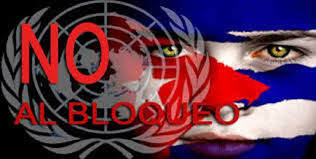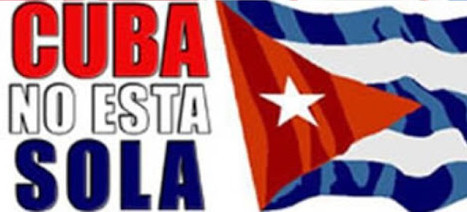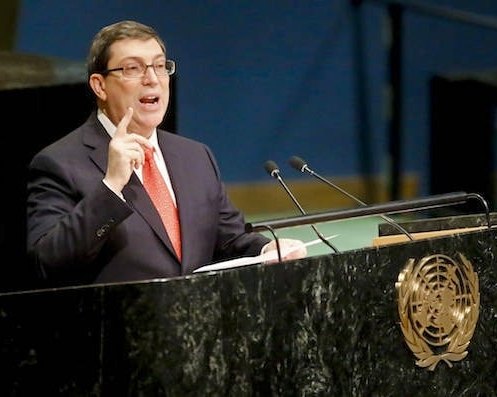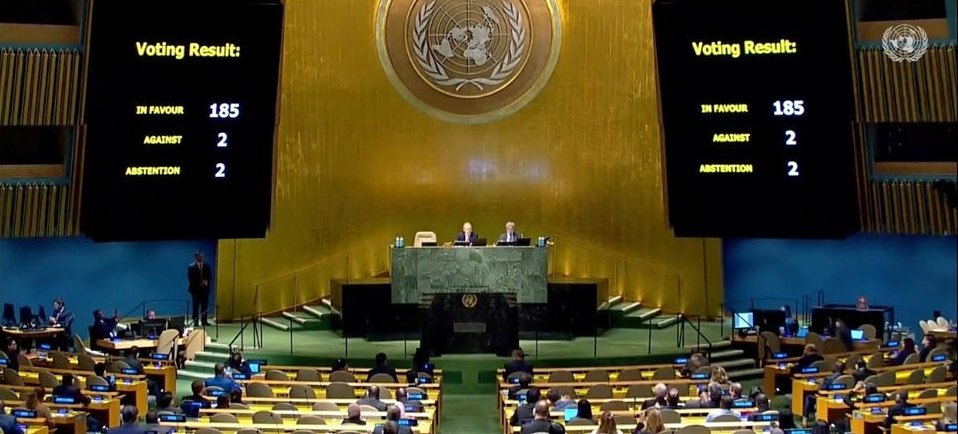November 4, 2022 - No. 42
The World Would Be Better Without the Blockade
Resounding Condemnation
of U.S. Blockade
by UN Member States
• UN General Assembly Debates Resolution Against the Blockade
• Discussion with Cuban Ambassador to Canada on 30th UN Vote to End the Blockade on Cuba
Video
• Cuba, Better
Without the Blockade -- Actions in Support
of Cuba and UN Vote
The World Would Be Better Without the Blockade
Resounding Condemnation of U.S.
Blockade
by UN Member States

This year marks 60 years of the economic, financial and commercial sanctions that make up the U.S. blockade which Cuba has been forced to endure and for the 30th year in a row, the United Nations General Assembly has voted overwhelmingly to support Cuba's resolution demanding an end to the U.S. blockade.
The result of the vote on November 3 was 185 countries in support of the resolution, two opposed, the U.S. and Israel, and two abstentions, Brazil and Ukraine. This compares to the 2021 vote, where 184 countries voted in favour of the resolution, the U.S. and Israel voting against and Brazil, Colombia and Ukraine abstaining.
The vote validates Cuba's position that the blockade is an act of war in times of peace, and the greatest obstacle to the development of the country. Cuban Foreign Minister Bruno Rodríguez said recently that the economic, commercial and financial sanctions "are unilateral, coercive, and illegal actions, from the point of view of international law, of the national law that governs the conduct of these banks and from the point of view of the universally accepted norms of the international financial system."
CPC(M-L) sends its warmest congratulations to the Cuban people, their leadership and its diplomatic staff at the UN for achieving yet another decisive international rejection of the U.S. blockade.
 The victory is indicative of not
only the outrageous and criminal nature of the blockade, but the
skill with which each year's resolution is so irrefutably
presented, rendering U.S. imperialist disinformation
ineffective, and ensuring that even close allies of the U.S.
cannot be seen to be supporting the blockade.
The victory is indicative of not
only the outrageous and criminal nature of the blockade, but the
skill with which each year's resolution is so irrefutably
presented, rendering U.S. imperialist disinformation
ineffective, and ensuring that even close allies of the U.S.
cannot be seen to be supporting the blockade.
The broad international support Cuba receives every year is also indicative of the tremendous prestige that Cuba commands due its unparalleled internationalism and its principled defence of the UN and its Charter, procedures and bodies, and the rule of international law.
The victory also belongs to the international solidarity movement which plays an important role to build people-to-people links with Cuba and influence the foreign policy of their countries to uphold friendly and cooperative relations with Cuba.
Cuban and what it represents to the peoples of the world stand in stark contrast to the isolation of the U.S. on the world stage and the condemnation of its foreign policy of dictate, blackmail and brutality by the nations of the world.
This victory at the UN lends important moral authority to all those who stand with Cuba and oppose against U.S. imperialist dictate that might makes right and gives impetus to the work to bring the blockade to an end, once and for all.

UN General Assembly Debates
Resolution
Against the Blockade
 On November 2, the Republic of
Cuba delivered its annual report to the UN General Assembly
which pointed out that after six decades, this policy has
inflicted accumulated damages, in current prices, that amount to
$154.2 billion. Interventions on the resolution by UN member
states at the General Assembly took place from November 2 to 3.
On November 2, the Republic of
Cuba delivered its annual report to the UN General Assembly
which pointed out that after six decades, this policy has
inflicted accumulated damages, in current prices, that amount to
$154.2 billion. Interventions on the resolution by UN member
states at the General Assembly took place from November 2 to 3.
Cuba's Minister for Foreign Affairs, Bruno Rodríguez Parrilla, speaking to the resolution, said that more than 80 per cent of Cuba's current population was born under the blockade. Since 2019, the U.S. government has escalated the embargo.
He went on to explain that during the pandemic, the blockade was further tightened, causing more delays in the delivery of necessary medical equipment. But despite limited resources, Cuba cooperated with other countries, sending medical brigades to provide aid. Equally unceasing, he said, is the fraudulent inclusion of Cuba in the United States Department of State's unilateral list of countries that allegedly sponsor terrorism. Minister Rodríguez pointedly stated that Cuba has rejected all forms of terrorism.
The current U.S. administration does not have a Cuba policy, Rodríguez continued. Rather, it continues to exert the "maximum pressure" policy developed under the Donald Trump administration. Over the last few months, it has taken positive steps to alleviate certain restrictions, but the blockade continues to be the central element defining Cuba-United States policy.
Interventions on November 2
The representative of Singapore, speaking on behalf of the Association of Southeast Asian Nations (ASEAN) and aligning himself with the Non-Aligned Movement (NAM) and the Group of 77 developing countries and China (G77+China), urged the U.S. to lift its economic, commercial and financial embargo without delay.
The representative of the Dominican Republic, speaking for the Central American Integration System (SICA), reiterated its deepest desire for the well-being and prosperity of the Cuban people. She said that the blockade, in addition to undermining Cuba's ability to overcome the current effects of the pandemic, over the last three decades had hindered its national project towards achieving sustainable development, and pointed out that despite the embargo, Cuba still has the ability to produce and distribute vaccines against COVID-19.
The representative of Argentina spoke on behalf of the Community of Latin American and Caribbean States (CELAC), reiterating its strong rejection of the U.S. application of laws and measures contrary to international law, such as the Helms-Burton Act, including their extraterritorial effects. She rejected the unfair inclusion of Cuba on the U.S. list of State Sponsors of Terrorism, saying it is completely unsubstantiated. Speaking in her national capacity, she noted that the blockade violates international law, stands in the way of basic rights and inhibits the economic and social development of the Cuban people. It further hampers Cuba's inclusion in the global economy by restricting access to concessional financing (below market rates that financial institutions give to developing countries), technology transfers, external capital mobilization and direct, foreign investment, amongst other things. The inclusion of Cuba on the list of State Sponsors of Terrorism, she continued, has increased the intimidatory effect of the restrictions associated with the blockade and further worsens Cuba's capacity to develop financial and commercial relations with international partners.
The representative of Pakistan spoke on behalf of the G77+China. He said he regretted that the blockade imposed by the U.S. for more than six decades remains in force. The G77+China, he said, is committed to the principles of the UN Charter, particularly the sovereign equality of states and non-interference in each other's internal affairs. It is the responsibility of every member state to comply with these principles, he stressed, calling for the unilateral sanctions to be immediately repealed.
The representative of the Bahamas, speaking on behalf of the Caribbean Community (CARICOM), and associating himself with the G77+China and the NAM, called for lifting the unilateral economic, commercial and financial embargo on Cuba. He said the embargo persists in defiance of international law and 29 General Assembly resolutions and that the U.S., CARICOM and Cuba all have a shared interest in a peaceful Caribbean underpinned by friendly relations amongst the states of the region on the basis of mutual respect and respect for international law.
The representative of Egypt, speaking on behalf of the Organization of Islamic Cooperation (OIC), said that it is particularly concerning that despite the overwhelming call year after year to end the embargo, the blockade has not ceased and is stronger than ever. He said he was once again joining the calls of the overwhelming majority of member states to put an end to the embargo.
The representative of Eritrea, speaking on behalf of the Group of Friends in Defense of the Charter of the United Nations, said the unjust and abusive blockade constitutes one of the most serious, prolonged and systematic violations of both international law and the UN Charter. In addition to being morally and politically shameful in its attempt to subjugate a small, peaceful and supportive country, the embargo transgresses Article 1 of the Charter by violating the rights of Cubans to conduct their internal affairs in a sovereign manner without interference. It also restricts other states from freely developing commercial ties with Cuba. The blockade further contravenes Article 2 by threatening Cuba's political independence, she noted. "The rejection of this aggravation of the Cuban people is not a question of sympathies or ideologies. It is a matter of defending justice, international law and the elementary sense of humanity that should prevail."
The representative of Azerbaijan, speaking on behalf of the NAM, said it has historically held a principled position of rejecting unilateral coercive measures that are not authorized by relevant UN organs; inconsistent with the principles of international law or the Charter or contravene the basic principles of the multilateral trading system; and are used as a tool of political or economic and financial pressure against states, particularly developing countries.
The representative of Mozambique, speaking on behalf of the UN's regional African Group, said that, for the 13th time, Heads of State and Government at the Group's Ordinary Session of the African Union Assembly in February reiterated their position and called for the lifting of sanctions on Cuba's government and people. He reiterated the African Union's position that the illegal sanctions, particularly the Helms-Burton Act, Title III, are the main obstacles to Cuba's achievement of the UN's 2030 Sustainable Development goals.
Representatives of Mexico, Venezuela, Honduras, Russia, China, Bolivia, Namibia, Dominica, Trinidad and Tobago, the Philippines, the Democratic People's Republic of Korea, Belarus, Vietnam, St. Vincent and the Grenadines, Equatorial Guinea, Syria, Colombia, Guyana, Kenya, Iran and Cambodia all rose to speak in support of Cuba and lifting of the U.S. blockade.
From Cuba, President Miguel Díaz-Canel Bermúdez praised the gestures of solidarity at the General Assembly with his country. He said they prove the self-isolation of the United States in imposing its policy of sanctions. He also extended his gratitude to former Latin American and Caribbean leaders who sent a letter to U.S. President Joe Biden urging him to lift the blockade and withdraw Cuba from the unilateral U.S. blacklist of State Sponsors of Terrorism.
Interventions on November 3
The representative of Saint Kitts and Nevis welcomed the previous steps made by Cuba and the United States to normalize their diplomatic relations, including the removal of the former from the latter's list of State Sponsors of Terrorism in 2015. However, it is regrettable that several reversals have since been made and the blockade is still a reality. She said the unjust embargo drives a stake through the heart of international law and makes a mockery of the principles of sovereignty and non-intervention that govern inter-state relations, which are protected by the Charter of the United Nations. The embargo severely impedes Cuba's ability to fully engage the international community and to adequately provide basic public services for its people and thereby its aspirations for meeting the Sustainable Development Goals.
The representative of Grenada said it is an appropriate time to renew the international community's commitment to the principles of the United Nations Charter and of international law. The embargo on Cuba imperils these norms and contradicts the principles of the Charter. Grenada recognizes the sovereign equality of states and joins the rest of the General Assembly to call for the immediate removal of the blockade against Cuba, which would facilitate economic transition there, she said. An overwhelming majority of member states share the view that the effects of the embargo are deleterious to how the United Nations carries out its activities in Cuba. That country has always extended a helping hand to developing nations, she said, adding that lifting the embargo is essential to the world peace that all desire. Constructive engagement and renewed negotiations are the only acceptable means for achieving peace and stability and creating the conditions for peaceful coexistence.
The representative of South Africa, aligning himself with the African Group, the NAM and the G77+China, emphasized Cuba's leading role in championing the rights of developing countries, assistance to those in need and commitment to South-South cooperation. He pointed out that the embargo has only stifled the socioeconomic growth and potential of the Cuban people, caused immense hardship and denied them their most basic rights. member states that believe in the universal, inalienable, indivisible, independent and interrelated nature of human rights must join this cause, he urged.
The representative of the Lao People's Democratic Republic called to end the blockade. Within the current international context of multifaceted challenges, the international community must provide all the necessary support and conducive conditions for Cuba -- as a sovereign and independent member state -- and its people to determine their own development path, he urged. There must be an end to the needless deprivation. All member states must redouble their collective efforts and commitment in advancing equitable and sustainable development and promoting the legitimate rights of people in accordance with the principles and purposes of the Charter, he stressed.
The representative of Malaysia, associating himself with ASEAN, the NAM, the G77+China and the OIC, reiterated his country's opposition to the imposition of unilateral coercive measures against any country. Such measures are contrary to international law, international humanitarian law, the Charter of the United Nations and the norms and principles of peaceful relations among states. These measures are against the very spirit of the 2030 Agenda to leave no one behind, he pointed out. Unilateral coercive measures will only cause social problems and worsen the humanitarian situation, and for that reason, the U.S. and Cuba must resolve their differences through negotiation.
The representative of Nicaragua, associating himself with the G77+China, the NAM, CELAC, SICA and the Group of Friends in Defense of the Charter of the United Nations, said that the blockade of Cuba is inhumane. Cuba, thanks to its consciousness, its revolutionary spirit and its socialist conviction and commitment to the world, has been able to stand alongside the developed countries who sanction it by producing vaccines and helping "our developing peoples." The blockade has had severe effects on the Cuban health system and is cruel and genocidal in nature. It aims at suffocating the economy, violating human rights and undermining the efforts of the brave Cuban people as they seek to implement the 2030 Agenda. He urged the United States to begin respectful dialogue to resolve pending bilateral matters with Cuba on the basis of the equality of States, respect for sovereignty and independence.
The representative of India said that, every year, the General Assembly has rejected the imposition of laws and regulations with extraterritorial impact and has called upon all states not to promulgate and apply such laws and measures upon other states, in compliance with international law. The existence of the embargo undermines multilateralism and the credibility of the United Nations itself. India stands in solidarity with the Assembly and its unambiguous rejection of such laws, he said. Such embargoes impede the socioeconomic development of the country involved as well as the enjoyment of such human rights as the rights to food, health and education, among others. They also overwhelmingly affect women and children. Continuing the embargo on Cuba would seriously impact that country's ability to comprehensively achieve the Sustainable Development Goals. The international community must intensify efforts to promote an environment free from sanctions and embargoes, he stressed.
The representative of Gabon said that no nation should be punished and exploited by another. The economic, commercial and financial blockade imposed on Cuba for 60 odd years is a punitive act against that country. It hampers the development of Cuba and the region as a whole. The blockade has resulted in excessive difficulties for the Cuban people, puts extraordinary pressures on Cuba's economy and restricts its ability to move goods. Given the peaceful and cooperative nature of Cuba, Gabon will continue to reaffirm its support for the Cuban people. He called for the urgent end of the embargo, which only feeds tensions and further strains relationships between Cuba and the United States. "It's an ongoing source of concern for the entire subregion," he added.
The representative of Zimbabwe said, "Every year, we speak about the devastating impact of the embargo on the people of Cuba, but we see no effort to remove the restrictions," underscoring the need to end the embargo in accordance with the principle of non-interference in the internal affairs of other countries. Over the years, Cuba has deployed medical teams to assist many countries, including Zimbabwe, to develop their health systems and to combat the COVID-19 pandemic despite its limited capacity due to the embargo. Zimbabwe itself has endured over two decades of sanctions imposed by some Western countries, which have had devastating impacts on Zimbabwe's people. He called for the lifting of the embargo on Cuba, particularly in the wake of the COVID-19 crisis and the global food, energy and financial crises.
The representative of Fiji remained concerned at the lack of progress by the General Assembly in ending the embargo. She condemned all forms of unilateral coercive measures, sanctions or embargo of any kind that impede the socioeconomic development of a friendly nation. Development challenges have only multiplied for small island developing states that are increasingly at the mercy of climate change, climate-induced sea level rise or other climate-related disaster. The embargo is an exclusionary policy that deprives Cubans of the right to exist freely as well as the right to food, development and trade, among other rights. She called on all states to continue to back the resolution in support of Cuba.
Also speaking in favour of the resolution were Peru, Ethiopia, Congo, Panama, Jamaica and Algeria, many of whom spoke highly of assistance they had received from Cuba despite its difficulties caused by the blockade.
Following the vote, some countries spoke about their reasons
for voting as they did, including the Czech representative who
cast aspersions on Cuba while Timor-Leste, Sri Lanka, Nauru, the
Solomon Islands and Indonesia all spoke about their principled
vote in favour of the resolution. There is no indication that
Canada spoke on this matter at any point.
The U.S. representative spoke to turn reality on its head,
claiming that all the ways in which the U.S. violates
international law and the human rights of the Cuban people are
an indication of the U.S. commitment to their "pursuit of
freedom, prosperity and a future with greater dignity." The UN
news report states that "He joined international partners in
urging the Cuban government to release political prisoners
immediately and unconditionally and protect the freedom of
expression and right to peaceful assembly of all individuals in
Cuba." Clearly, the U.S. should heed its own advice which
applies to the United States, not Cuba.
The discussion ended with Cuba exercising its right of reply to the U.S. representative. Cuba said that the agenda item should not be diverted by fallacious U.S. allegations when the Assembly has overwhelmingly sent a message to urgently end the blockade.
The U.S. representative said his government is concerned about the Cuban people's plight. If this is the case, how could it justify that it used the pandemic to step up the blockade, the Cuban representative asked. He rejected the U.S. campaign of disinformation directed at Cuba, refuting claims about those who were detained in July 2021 for attempting to subvert the Cuban state. He noted that the U.S. detained more than 800 people following the events in Washington, DC on January 6, 2021, asking whether no other country has the right to also defend its institutions. The forces of external regime change will not be allowed to subvert the political system that Cubans have freely chosen, and Cuba will continue to strengthen its legislative and institutional framework to protect human rights and to ensure full respect for its laws, he said.
He went on to say that Cuban authorities have provided enough information to corroborate respect for due process within the country's borders. The only arbitrary arrests and penitentiary prolonged imprisonment on Cuban territory are those of the U.S. government at the Guantanamo Bay Naval Base. A country with racism, xenophobia, slander and lies, where money and corporate interests define who is elected, cannot teach Cuba lessons about democracy. Cuba will not accept questioning of this type, particularly when it is used to justify the longest, most broad-based unilateral coercive measures that have been imposed on any country. Instead, the U.S. should look at its own racism, repression, police brutality, secret jails, extrajudicial arrests and use of torture within its borders.
Cuba's representative concluded by bluntly stating that the U.S. representative is lying when speaking about aid to Cuba. The payments referred to are cynically made to subvert the system. There is irrefutable proof that the blockade hampers the sending of aid to Cuba, including from third-party countries. Cuba has firmly and creatively faced the application of the economic, commercial and financial embargo that has been opportunistically worsened by the pandemic, he said, adding that the Cuban people did not cede to subversive media campaigns by the U.S. "Nothing will be enough to erode our determination to resist, to fight and to win," he stressed.
(With files from UN General Assembly press releases.)
Discussion with Cuban Ambassador to Canada on 30th UN Vote to End the Blockade on Cuba

Ottawa
Friday, November 4 -- 7:00 pm
Friends House, 91A Fourth Ave.
Organized by Ottawa-Cuba Connections
and Association d’amitié Outaouais-Cuba
For information: ottawacubaconnections@gmail.com
or outaouaiscuba@yahoo.ca
On Friday, November 4, Ottawa Cuba Connections (OCC) and Outaouais Cuba will be joined by His Excellency Héctor Igarza, Ambassador of the Republic of Cuba in Canada to discuss the results of the November 2-3 vote at the UN General Assembly on the "Necessity of ending the economic, commercial and financial blockade imposed by the United States of America against Cuba."
Everyone welcome!
Video
Cuba, Better Without the Blockade -- Actions in Support of Cuba and UN Vote
(To access articles individually click on the black headline.)
Website: www.cpcml.ca Email: editor@cpcml.ca


